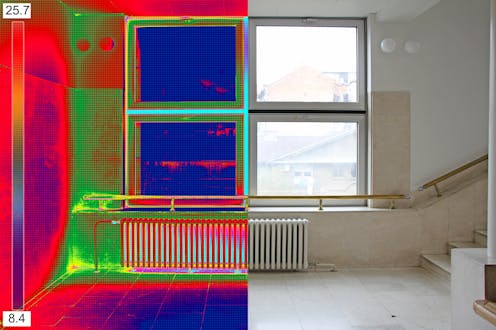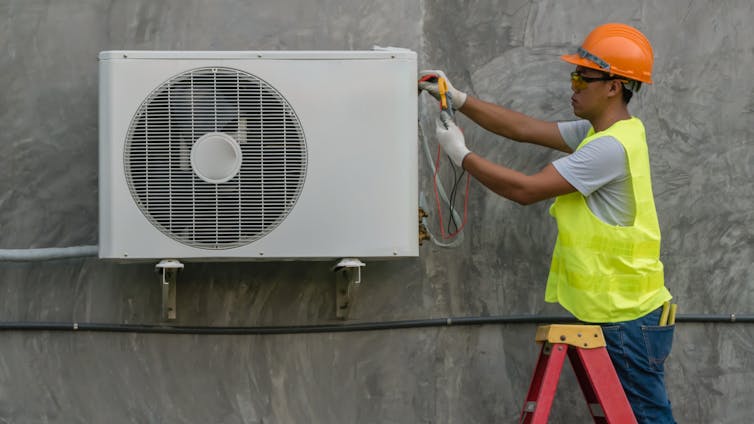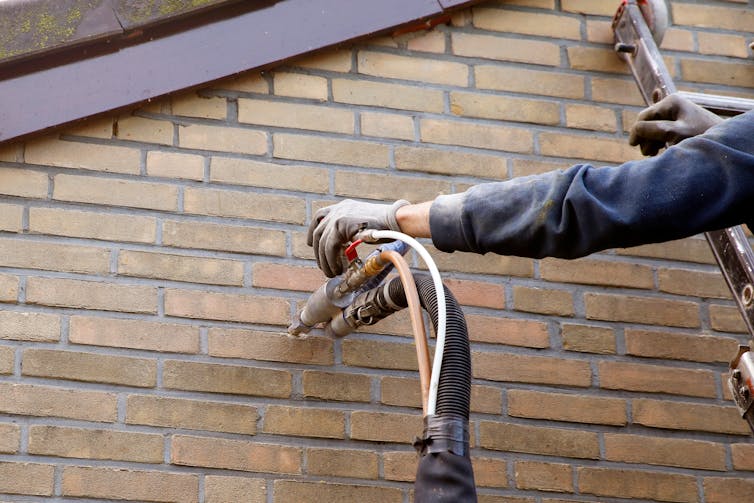
The UK aims to replace 1.7 million gas boilers a year by the mid-2030s, as part of its plan to reach net zero. This will require rapidly scaling up the installation of heat pumps which can run on renewable electricity. Just 67,000 were installed in 2021.
But without consistent action to improve home insulation, newly installed heat pumps could struggle to heat a building adequately, burden homes with hefty electricity bills and even overload the grid.
The government recently announced a £1 billion scheme which would give households in lower council tax bands up to £15,000 to upgrade their home’s energy efficiency. Chancellor Jeremy Hunt also promised a £6 billion support package for home insulation in 2025-28.
The extra funding is welcome but, because it only offers help to a fraction of those who need it, it has the hallmarks of another short-lived funding announcement which tackles only part of the problem.
Why heat pumps need energy efficiency
Depending on its design and the season, a heat pump is very efficient at turning electricity into heat. But it is much harder (and demands more energy) to maintain a constant temperature in a draughty home. Heat pumps have to be made bigger in such circumstances.
Read more: Should you get a heat pump? Here's how they compare to a gas boiler
Switching to such energy-hungry heat pumps en masse might strain electricity supplies, particularly during peak hours. Replacing one in five boilers with a heat pump would increase weekday evening electricity demand by 14% according to one estimate. Higher energy consumption means more renewable energy is needed for decarbonisation.
This is why researchers have proposed improving the energy efficiency of a home before replacing its heating source. Unfortunately, the fragmented government schemes which have emerged so far insist on keeping energy efficiency measures separate from those concerned with installing alternative heating systems.

Electricity is also more expensive than gas, both per unit of energy (kilowatt-hour) and for the daily standing charge, So locking consumers into higher electricity demand will create higher bills. In the middle of a cost of living crisis, it is irresponsible to promote and install heat pumps without making sure they can operate as efficiently and cost-effectively as possible.
These risks are easily avoided. Civil servants, researchers and construction workers know how to improve the energy efficiency of homes, and all of the technologies necessary to do this exist. The problem is that the many in government, boiler and heat pump manufacturers and companies that run gas infrastructure are preoccupied with replacing household heating technology, when they actually need to address a whole home’s energy needs.
Follow the blueprint
Most heat pump installations require some modification of existing radiators and pipes. Working out where heat is escaping and blocking gaps or insulating cavities is not a major complication to this process. It does, however, require a range of different skill sets. Joiners, plasterers and builders need to share a language and understanding with the heating engineer and the plumber. Tradespeople already work in multi-trade groups, heat pump installation requires a similar combination of expertise.
It’s true that there are not enough qualified tradespeople with skills across plumbing, heating, building and electrical work to deliver energy efficiency measures for all homes, and to meet anticipated demand for heat pumps.

But that creates a huge opportunity for the construction industry to cut home energy demand and carbon emissions while providing high-skilled, well-paid jobs across all regions of the UK. The industry itself has even produced a blueprint for how this could be achieved, although government plans do not so far acknowledge these recommendations.
Energy efficiency measures might raise the cost of a heat pump installation. But, if done together, the additional costs may not be much. The government’s Climate Change Committee advisory body estimated that, on average, a UK home would need £3,000 to cover insulation and draught proofing to make installing a heat pump energy efficient. Making these renovations in one go would limit disruption and, in the longer term, create a more comfortable home with lower operating costs.
The best way to keep costs low for the public and the government is with a programme that enables whole house improvements for all homeowners. This entails financial support for those who most need it, building capacity and trust in the construction industry and encouraging households who can already afford it to contribute to work on their homes.

Don’t have time to read about climate change as much as you’d like?
Get a weekly roundup in your inbox instead. Every Wednesday, The Conversation’s environment editor writes Imagine, a short email that goes a little deeper into just one climate issue. Join the 10,000+ readers who’ve subscribed so far.
Alice Owen has received funding from UK Research & Innovation (UKRI), through the UK Energy Research Centre, to explore how small construction firms can deliver energy efficiency in existing homes. She is a member of the Construction Leadership Council's Repair, Maintenance and Improvement (RMI) Working Group.
Faye Wade has received funding from UK Research & Innovation (UKRI), Built Environment-Smarter Transformation, the Scottish & Norhern Ireland Plumbing Employers Federation (SNIPEF) and Energy Saving Trust Scotland to study the role of heating engineers in low carbon transitions. Faye has also received funding via Scottish Government to evaluate pilots for the Energy Efficient Scotland retrofitting programme, and via the Centre for Research into Energy Demand Solutions (CREDS) to study supply chains for energy retrofit.
This article was originally published on The Conversation. Read the original article.







